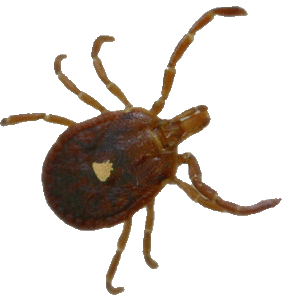
Ticks are vectors for a variety of zoonotic diseases such as Lyme disease, Rocky Mountain spotted fever, and Ehrlichiosis.
You have probably been thinking about zoonoses (zew oh NO sees, plural form of zoonosis) this week whether you realized it or not. A zoonosis is any infectious disease that can be spread from animals to humans, or vice versa. It’s estimated that over 60% of human pathogens that cause disease are zoonoses.
One of the most common ways zoonoses spread is via some form of vector, or intermediate host (carrier) that serves to spread the pathogen. Mosquitoes, for example, are vectors for a variety of zoonotic diseases including yellow fever, malaria, and dengue fever. On the other hand, rabies is an example of a zoonosis that can be transmitted directly from animal to human without a vector (via contact with saliva of the infected animal).
If you haven’t guessed already, the West Nile virus (WNV) is a zoonosis. Some mosquito species, principally the house mosquito Culex quinquifasciatus in north Texas, serve as vectors of WNV from its usual bird hosts to humans and horses. In the case of WNV, humans and horses are dead-end hosts–that is, once the pathogen is transmitted to people or a horse, it can’t go anywhere else. So a mosquito can’t bite an infected human and transfer the WNV to infect another human.
The study of zoonoses is complicated and fascinating, and important to public health. Fortunately for us, the state of Texas employs a number of zoonosis control specialists in the Department of State Health Services to monitor and study and offer advice on how to protect us from zoonotic diseases. If you’ve heard about mosquitoes being tested for viruses in the past few weeks, you’ve been hearing about the work of these zoonosis specialists. They provide fast turnaround to let cities know whether, for instance, aerial spraying is doing what it’s supposed to do, and whether additional sprays might be needed.
In some instances, our state zoonosis specialists offer diagnostic assistance directly to the public, as in the case of tick testing for Lyme and related diseases. More often, they work behind the scenes providing assistance to communities fighting diseases like WNV, dengue fever, murine typhus, plague, or rabies. Even the military relies on zoonotic experts to protect our troops from infectious diseases when at home and abroad. Zoonotic specialists with the Texas Department of State Health Services and the Centers for Disease Control (another national source of zoonotic expertise) were the ones recommending that Dallas and other communities consider aerial spraying to stem the WNV epidemic. Although ultimately decisions about whether to spray or not are political and ethical, the debate is informed by the expertise of zoonosis professionals.
In pondering the recent debates in my community over spraying, it occurs to me that most people have little appreciation of the tremendous amount of time and effort that goes into studying zoonotic diseases. I’ve heard numerous people in television interviews and on the Internet describe community spraying decisions as “hasty”, “emotion-based”, “knee-jerk”, or “heavy handed”. But the science advising these decisions is careful, deliberate, and rational. And we have the zoonotic specialists to thank for that.